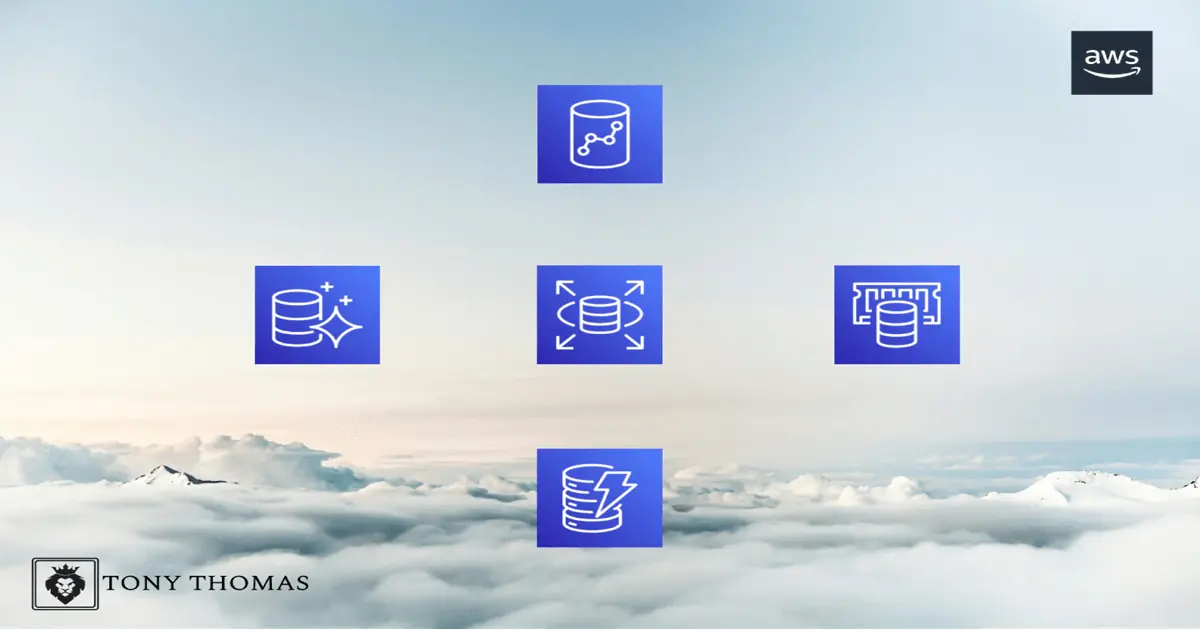Looking to take your business’s data storage to the next level? Look no further than AWS (Amazon Web Services) Database Services. With a suite of powerful and reliable options to choose from, including RDS, Aurora, DynamoDB, ElastiCache, and Redshift, AWS has all your database needs covered.
Table Of Content
AWS Relational Database Service (RDS)
When it comes to managing traditional SQL databases, AWS Relational Database Service (RDS) is the ideal choice. RDS offers a fully managed solution that allows you to easily set up, operate, and scale a relational database in the cloud. With RDS, you can focus on your application rather than worrying about the underlying infrastructure.
One of the key benefits of RDS is its scalability. You can easily scale your database up or down depending on your needs. This flexibility allows you to handle sudden spikes in traffic or accommodate the growth of your business without any hassle. Additionally, RDS provides automatic backups, ensuring that your data is always protected and easily recoverable.
In terms of compatibility, RDS supports a wide range of database engines, including MySQL, PostgreSQL, Oracle, and Microsoft SQL Server. This means that you can easily migrate your existing databases to RDS or choose the engine that best suits your application requirements.
RDS also offers various performance-enhancing features, such as read replicas and Multi-AZ deployments. Read replicas allow you to offload read traffic from your primary database, improving overall performance. Multi-AZ deployments provide high availability by automatically replicating your database to a standby instance in a different Availability Zone.
With its ease of use, scalability, and compatibility, RDS is a top choice for businesses looking to leverage the power of AWS database services.
AWS Aurora
If you’re looking for a high-performance, fully managed relational database service, AWS Aurora is the solution for you. Aurora is compatible with both MySQL and PostgreSQL, offering the best of both worlds in terms of performance, scalability, and durability.
Aurora utilizes a distributed architecture that allows it to scale both read and write operations across multiple instances. This means that even as your data grows, Aurora can handle the increased workload without compromising on performance. In fact, Aurora is known for its ability to deliver up to five times the performance of traditional MySQL databases and up to three times the performance of PostgreSQL databases.
In addition to its impressive performance, Aurora also offers built-in fault tolerance and self-healing capabilities. It automatically replicates your data across multiple Availability Zones, ensuring high availability and durability. If a failure occurs, Aurora can quickly and transparently recover without any impact to your application.
With its high performance, scalability, and fault-tolerant design, AWS Aurora is the go-to choice for businesses that require a powerful relational database service.
AWS DynamoDB
For applications that require lightning-fast performance and seamless scaling, AWS DynamoDB is the database service of choice. DynamoDB is a fully managed NoSQL database that can handle any amount of traffic and automatically scales up or down to accommodate your needs.
DynamoDB is designed to provide single-digit millisecond latency at any scale, making it perfect for use cases such as mobile, web, gaming, and Internet of Things applications. Whether you’re building a real-time analytics dashboard or a high-traffic e-commerce platform, DynamoDB can handle the workload with ease.
One of the key advantages of DynamoDB is its flexible data model. Unlike traditional relational databases, DynamoDB does not require you to define a fixed schema upfront. This allows you to iterate quickly and adapt to changing requirements without any downtime or schema migrations.
DynamoDB also offers built-in security features, such as fine-grained access control and encryption at rest. This ensures that your data is protected from unauthorized access and provides peace of mind for businesses that deal with sensitive information.
With its exceptional performance, scalability, and flexibility, AWS DynamoDB is the perfect choice for modern applications that require speed and agility.
AWS ElastiCache
Need an in-memory caching solution? Look no further than AWS ElastiCache. ElastiCache is a fully managed in-memory data store that allows you to improve the performance of your applications by offloading read-intensive workloads to a cache.
ElastiCache supports two popular open-source caching engines: Memcached and Redis. Memcached is a simple and fast caching engine that is widely used for caching web pages and objects. Redis, on the other hand, is a versatile caching engine that offers additional features such as data persistence and advanced data structures.
By caching frequently accessed data in memory, ElastiCache reduces the load on your backend databases and improves overall application performance. This is particularly useful for applications that require low latency and high throughput, such as real-time analytics platforms and high-traffic websites.
ElastiCache is fully compatible with other AWS services, making it easy to integrate with your existing infrastructure. It also provides automatic failover and backup capabilities, ensuring that your cached data is always available and protected.
With its simplicity, cost-effectiveness, and seamless integration with other AWS services, ElastiCache is the go-to choice for businesses looking to boost application performance.
AWS Redshift
When it comes to data warehousing and analytics, AWS Redshift is the ultimate solution. Redshift is a fully managed, petabyte-scale data warehouse that provides lightning-fast query performance and enables you to analyze large datasets with ease.
Redshift utilizes columnar storage and parallel query execution to deliver unmatched performance for analytical workloads. It can process massive amounts of data in a fraction of the time compared to traditional databases, allowing you to gain insights quickly and make data-driven decisions.
In addition to its performance, Redshift also offers advanced compression techniques that significantly reduce storage costs. By compressing your data, Redshift can store and query large datasets at a fraction of the cost of traditional data warehousing solutions.
Redshift integrates seamlessly with other AWS services, such as S3 and AWS Glue, making it easy to load data from various sources and transform it into actionable insights. It also supports a wide range of business intelligence tools, ensuring compatibility with your existing analytics workflows.
Whether you’re running complex ad-hoc queries or performing real-time analytics, AWS Redshift provides the speed, scalability, and cost-effectiveness required for modern data warehousing and analytics.
Comparison of AWS database services
Now that we’ve explored the key features and benefits of AWS database services, let’s compare them side by side to help you choose the right option for your business.
| Service | Relational Database Service (RDS) | Aurora | DynamoDB | ElastiCache | Redshift |
|---|---|---|---|---|---|
| Database Engine Support | MySQL, PostgreSQL, Oracle, Microsoft SQL Server | MySQL, PostgreSQL | NoSQL | Memcached, Redis | N/A |
| Scalability | Vertical and Horizontal Scaling | Horizontal Scaling | Automatic Scaling | N/A | N/A |
| Performance | High Performance | High Performance | Lightning-fast Performance | Improved Read Performance | Lightning-fast Query Performance |
| Durability | Automated Backups | Automated Backups | Automated Backups | N/A | N/A |
| Compatibility | Wide range of Database Engines | MySQL, PostgreSQL | N/A | N/A | N/A |
| Use Cases | Traditional SQL Databases | High-performance Relational Databases | Mobile, Web, Gaming, IoT Applications | In-memory Caching | Data Warehousing, Analytics |
Choosing the right AWS database service for your business
With so many options to choose from, selecting the right AWS database service for your business can be a daunting task. However, by considering your specific requirements and use cases, you can make an informed decision.
If you’re managing traditional SQL databases and require scalability and easy management, AWS Relational Database Service (RDS) is the way to go. It offers a wide range of database engine support and provides automated backups for data protection.
For high-performance relational databases with scalability and fault tolerance, AWS Aurora is the ideal choice. It combines the best features of MySQL and PostgreSQL and can handle heavy workloads without compromising on performance.
If speed and scalability are your top priorities, AWS DynamoDB is the perfect fit. It is designed for lightning-fast performance and seamless scaling, making it suitable for mobile, web, gaming, and IoT applications.
For in-memory caching, AWS ElastiCache is the go-to solution. It enables you to offload read-intensive workloads to a cache, improving application performance and reducing the load on your backend databases.
Finally, if you need a petabyte-scale data warehouse for analytics, AWS Redshift is the ultimate choice. It provides lightning-fast query performance and advanced compression techniques for cost-effective storage.
By carefully considering your specific requirements and evaluating the features and benefits of each service, you can select the AWS database service that best meets your business needs.
Best practices for using AWS database services
To make the most out of AWS database services, it’s important to follow best practices that ensure optimal performance, security, and cost-effectiveness.
First and foremost, it’s essential to choose the right database engine for your application requirements. Consider factors such as data structure, scalability, performance, and compatibility when selecting a database engine.
Proper sizing and scaling are also crucial for optimal performance. Monitor your database’s performance metrics and adjust the instance size and storage capacity as needed. Additionally, consider implementing read replicas, Multi-AZ deployments, and caching to further improve performance and availability.
Data security should be a top priority when using AWS database services. Implement strong access controls, encrypt sensitive data, and regularly apply security patches and updates. Regularly backup your data and test the backup and restore process to ensure data recoverability in case of an incident.
Cost optimization is another important aspect to consider. Monitor your database’s usage and adjust the instance size and storage capacity to match your workload. Take advantage of features like reserved instances and spot instances to reduce costs without compromising performance.
Lastly, regularly monitor and analyze your database’s performance metrics to identify any bottlenecks or areas for improvement. Use AWS’s monitoring and logging tools to gain insights into your database’s performance and troubleshoot any issues.
By following these best practices, you can ensure that you’re getting the most out of AWS database services while maintaining optimal performance, security, and cost-effectiveness.
Conclusion
AWS Database Services offer a powerful suite of options to meet your business’s data storage needs. Whether you require a traditional SQL database, a high-performance relational database, a NoSQL database, in-memory caching, or a petabyte-scale data warehouse, AWS has you covered.
AWS Relational Database Service (RDS) provides easy scalability and automated backups for traditional SQL databases. Aurora combines the best features of MySQL and PostgreSQL for high-performance relational databases. DynamoDB offers lightning-fast performance and seamless scaling for mobile, web, gaming, and IoT applications. ElastiCache provides a cost-effective in-memory caching solution. Redshift delivers lightning-fast query performance and petabyte-scale data storage for data warehousing and analytics.
By understanding the unique features and benefits of each service and considering your specific requirements and use cases, you can choose the right AWS database service for your business. Follow best practices for optimal performance, security, and cost-effectiveness, and unlock the full potential of AWS database services.
Discover the power and flexibility of AWS database services today and take your business’s data storage to the next level.







